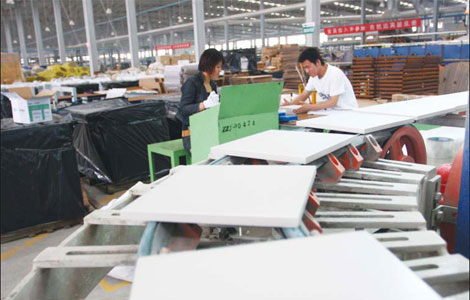EU ruling irks Chinese tile makers
Updated: 2011-03-11 10:46
By Yan Yiqi (China Daily European Weekly)
 |
|
Less than 8 percent of ceramic tiles sold in the EU market are sourced from China. Provided to China Daily |
Chinese ceramic tile makers have criticized the European Union's plan to impose stiff duties on ceramic tile imports from China and termed the action "unfair".
The EU in its defense argued that European tile producers were affected by imports of Chinese ceramic tiles at low prices.
"Chinese ceramic tiles account for only 8 percent of the European market, and our prices are lower because of low labor and production costs," says Fan Ruixin, chief engineer of the China Ceramics Industrial Association.
According to Reuters, the EU plans to increase import duties on Chinese ceramic tiles by up to 73 percent from 5 percent, and the decision may affect exports of some 275 million euros worth of tiles.
The new duties are expected to come into effect on March 18 and stay in place for six months. The commission is also considering whether to impose definitive duties, which could be valid for five years, by Sept 18.
Fan, however, says the export volume of Chinese ceramic tiles is not that large enough to make an impact on European producers.
"Although China is the largest exporter of ceramic tiles in the world, only 10 percent of its exports go to Europe," says Fan.
The EU's knee-jerk reaction could be due to the slow recovery of the European ceramics industry from the economic recession, says Miao Bin, secretary general of the China Building Ceramics and Sanitaryware Association.
"The unemployment rate among ceramics producers in Europe has not decreased yet, and some production lines are still closed. The EU is afraid that Chinese ceramic tiles will garner a bigger market share," says Miao.
"Europe's ceramics industry has been looking for years for ways to attack growing imports from China, so it's not surprising the duties are quite high," Reuters quoted an EU diplomat as saying.
The EU is the world's second biggest ceramic tiles producer after China and exports nearly 25 percent of its production. The EU uses about 1 billion square meters of floor and wall tiles every year, and nearly 8 percent of the requirement is sourced from China.
"Chinese ceramic tiles account for only a small part of the European market. Italy and Spain have been leading the industry for decades with better quality and high prices," says Deng Weibo, deputy general manager of Foshan Diamond Ceramics in Guangdong province.
"Europeans, with higher purchasing capacity, will opt for locally manufactured products as they believe it guarantees better quality."
"Some customers will choose Chinese ceramic tiles, because our prices are more reasonable," says Deng.
According to statistics, the average price of Chinese ceramic tiles in the EU market is around $5 (3.6 euros) per square meter, while that of Italian and Spanish tiles is around $13 per sq meter.
Deng says his order volumes to Europe have not been affected so far. "But our European clients have asked us to ship the ordered ceramic tiles to Europe before mid-March. They are more afraid of the higher import duties than us."
According to Deng, most of the Chinese ceramics producers are still focusing on the domestic market. "I have seldom heard of a ceramic tile company whose European sales account for more than 30 percent of their total volume, but I do know some European importers who depend entirely on China," says Deng.
He says many of his European clients have expressed fears of Chinese companies exiting the market. "Our largest overseas market is not in Europe, but in Southeast Asia and Australia. Profitability is small in the low-end European market, while shipping costs are high. If necessary, we will consider leaving the market."
Deng's company is not the only Chinese ceramics producer that is thinking of altering its business strategy.
Wu Jianfeng, general manager of Hongyu Ceramics, says his company may leave the European market if the 73 percent duties are imposed.
"This will be a lose-lose situation because European importers will lose important business partners. After all, not all customers in Europe can afford exquisite Italian tiles," says Wu.
Hongyu Ceramics sold about $3 million (2.2 million euros) worth of products in Europe last year, accounting for some 10 percent of its total sales.
Fan, however, believes that the higher import duties will have a negative impact on Chinese ceramic producers.
China is the largest producer of ceramic tiles. Although the industry does not rely on overseas markets, the cooling down of the domestic real estate industry has brought survival threats for ceramics makers. "That is why they are turning to overseas markets, including Europe," says Fan.
According to the Ministry of Commerce, China exported ceramic tiles worth $2.86 billion in 2009, with $310 million worth of tiles going to the European market. Exports accounted for 10.7 percent of the total sales volume of China's ceramic tiles industry in 2009. The 2010 figures are not available yet.
E-paper

Pearl paradise
Dreams of a 'crazy' man turned out to be a real pearler for city
Literary beacon
Venice of china
Up to the mark
Specials

Power of profit
Western companies can learn from management practices of firms in emerging economies

Foreign-friendly skies
About a year ago, 48-year-old Roy Weinberg gave up his job with US Airways, moved to Shanghai and became a captain for China's Spring Airlines.

Plows, tough guys and real men
在这个时代,怎样才"够男人"? On the character "Man"
